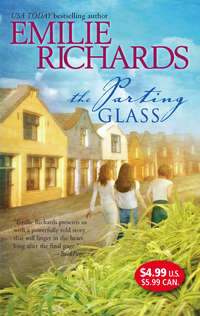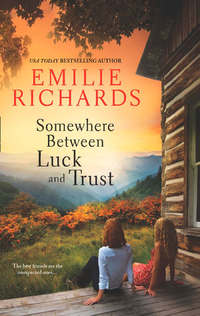
Полная версия
Rising Tides
Cappy Gerritsen stopped on the third step from the top, her posture regal. Dawn envisioned a younger Cappy, the prewar New Orleans debutante, gliding across the floor of her family’s River Road home with a volume of Emily Post on her head.
Cappy’s body was still gracefully curved and firm, and though she was a size larger than the six she claimed, neither age nor an extra fifteen pounds could destroy her basic beauty. No silver showed in her pale gold hair, and only twin frown lines between perfectly shaped eye brows signaled her basic dissatisfaction with life.
“Don’t badger Dawn, Cappy,” Ferris warned. “Just be glad she’s home.”
Dawn went to the head of the stairs, but her mother had made it impossible to embrace her. Cappy had al ways been three impossible steps away. “You look wonderful,” Dawn said. “Daddy’s plan to become the next Huey Long must agree with you.”
Cappy didn’t attempt to be polite. “You could have called.”
“I know.”
“Your grandmother dies, and you can’t even call your father or me to tell us you’re sorry?”
“Cappy.” Ferris joined his daughter. “Dawn and I have already discussed this.”
Dawn dredged up a smile. “I’ll go on record. I’m a failure as a daughter. Okay? Now can we go on to some thing else?”
“You disappeared off the face of the earth for a year. You didn’t call. You didn’t write. You didn’t visit. What are we to you, anyway?”
The smile died. “Right now you’re a living reminder of why I didn’t do any of those things.”
“Well, your grandmother’s not a reminder anymore, is she? Where were you when she needed you here?”
“You know where I was. I was in England, trying to find out if there was anywhere in this world where I could be something more than a member of this family.”
“You don’t have to be part of this family at all!”
Ferris stepped between them. “I’m not going to listen to any more of this.” He turned to Dawn. “There’s enough happening here without you and your mother going after each other.”
She shook her head in wonder. “My God, I’m a kid again.”
“Both of you are tired,” Ferris said. “This is a difficult time. Wait until you’ve rested before you talk.”
“I found Pelichere. She has drinks out for us.” Cappy started down the steps.
Dawn accepted Ferris’s brief hug, but she didn’t re turn it. “I’ll be down in a little while,” she said. “Let me comb my hair.”
She waited until he was gone before she took up her station at the window again. A year ago she had journeyed to another continent to banish her emotions, but now she knew she hadn’t succeeded. The child who had summered in this room was still inside her. The teenager who had longed for the love of her parents dwelt there, too. And the young woman who had given herself body and soul to Ben Townsend still cried out for understanding and forgiveness.
By the faint glimmer of a cloud-hazed moon, Pelichere swept the cottage gallery until not one grain of sand was lodged between the weathered boards. Dawn had offered to do it for her, but Pelichere had refused.
“I doubt anyone will even notice the fine job I’m doing,” Pelichere said, “but your mama would notice if the job wasn’t so fine. Mais yeah. She’d notice, just like she noticed the water stains on her bedroom ceiling, under the spot where the shingles blew off last week.”
Dawn leaned against a pillar, not at all anxious to go inside again. After an evening that had seemed endless, the house was quiet now, as if everyone had scurried to their rooms like ghost crabs hiding from shadows. She hoped they all stayed in their individual holes, particularly her parents. “Did she give you trouble?”
“How was I to know that storm would pry off shingles that haven’t budged in a century? At fifty-seven I’m supposed to climb up on the roof and inspect, shingle by shingle, every time it rains? I’d be up on the roof more than I’d be down on the ground. So maybe your parents should make their home on Grand Isle now that your grandmother, she’s dead. What shingles would blow off with Senator and Mrs. Ferris Lee Gerritsen living here?”
“Is it going to be their house after the will’s read? Seems to me Grandmère always said she was going to leave the house to you.”
“She said that, yeah. But there was more she didn’t say.”
A shrill whistle cut through the air. Pelichere turned and raised a hand in greeting as a pickup rattled along the oak-lined drive. “Joe and Izzy Means from down the road. Do you remember them, chère?”
“A little.”
Joe and Izzy got out, and Joe went around to the back of the truck, while Izzy trundled her substantial bulk up the path to the house. “I been cooking,” Izzy said, be fore she’d even reached the steps. “And cooking, cooking, cooking. It’s not right you should have to cook for the next four days, you with guests.”
Dawn was sure Izzy knew the so-called guests weren’t Pelichere’s. She supposed that was half the reason Izzy had arrived. In South Louisiana, keeping up with neighbors was still the favored evening recreation.
Pelichere introduced Dawn, and Dawn leaned over for Izzy’s enthusiastic kiss. Then she watched Joe, one ton to Izzy’s two, stagger up the path, well behind his wife, his arms loaded with grocery bags.
“What’d you go and do, Izzy?” Pelichere asked. “Drain the Gulf and cook everything left wriggling on the bottom?”
Pelichere scolded her friend while Joe made several trips from the truck. He left when he had finished, announcing that he was going down to the water to see what the dedicated fishermen still lining the beach were pulling in.
“Pelichere, you sit out here with Izzy,” Dawn said. “I’ll bring you both some coffee.”
Pelichere demurred, but Dawn ignored her. She re turned in a moment with cups and a pot of coffee Pelichere had left to drip in the kitchen. The coffee was thick and rich, black as goddamn, just the way Pelichere and Izzy liked it. Strong dark-roast coffee was as much a part of the local culture as seagulls and fishing luggers.
“So tell me, Peli,” Izzy said, stirring three spoonfuls of sugar into her coffee—for energy, “how’s it going?”
Dawn left them to chat.
The kitchen was one of the more modern rooms in the house. The original kitchen had been built behind the house as protection against fire and summer heat. The foundation was still visible fifty feet away, and a portion of one wall remained, blanketed by an orange-flowering trumpet vine that was often alive with the frantic darting of hummingbirds.
The new kitchen was large and airy. Tonight the blue gingham curtains billowed to the opposing rhythms of the wind and two ceiling fans. More wind blew through a screen door, carrying with it the scents of the distant Gulf and a closer tangle of honeysuckle.
Dawn sorted through the bags Joe had carried in. Nothing was labeled, but she recognized much of it. There were two gallons of gumbo, thick with small crabs and okra, Tupperware containers of jambalaya with chunks of dark sausage and green pepper, pounds of cold spiced shrimp and, although it was the end of the season, several pounds of boiled crawfish, as well. There was a freshly caught redfish, inviting Pelichere’s master touches, and close to a half gallon of freshly shucked oysters. “Good news, Grandmère,” she said as she stowed the last of it in the refrigerator. “It’s hot as hell and twice as much fun at your little house party, but at least we’ll eat like royalty.”
A voice sounded behind her. “Has anything been left out?”
She didn’t turn, but she knew the voice was Ben’s. “Still one big appetite looking to be satiated, aren’t you?” She dug back into the refrigerator and took out the boiled shrimp, holding it behind her. “Cocktail sauce?”
“Please.”
She opened a jar and sniffed it after Ben took the shrimp. “Peli’s own remoulade. You’re a lucky man.” She straightened and faced him. “This is supposed to be for tomorrow and after. Peli had food on the stove for over an hour tonight. Didn’t anybody tell you?”
“I ate.”
“I rest my case.”
“Join me?”
She determined to be casual and beat him at his own game.
“I don’t think so. I’m going to clean the kitchen before Peli gets back in here. There’s no reason for her to be waiting on us hand and foot. She’s as much Grandmère’s guest as the rest of us.”
He pulled out a chair beside the round oak table under a trio of windows. “It’s nice of you to be concerned.”
“But then, I’m a nice person, basically.”
“That wouldn’t be the first adjective that came to mind when someone looked at you nowadays.”
She cleared the sink of dirty dishes and ran a dish cloth around it. Then she filled it with hot soapy water, rolling up the sleeves of her shirt while she waited for him to elaborate.
“Once upon a time, a lead-in like that would have had you brimming with curiosity,” Ben said.
“Once upon a time? In a fairy tale, you mean?”
“It probably was a fairy tale.”
“Without the traditional ending.”
He elaborated, since she had refused to pick up on his cue. “The adjective that comes to mind now is determined.”
“Neat choice. Not positive, not negative. Ambiguous enough to please anybody who likes to free-associate.”
“I’ll give it a whirl. Determined to get through this ordeal. Determined to be polite. Determined not to show any feelings. Determined to point out how much you’ve changed.”
“Only parts of me have changed. None of the things you condemned have changed at all.” She slid plates into the sink and began to wash. “Condemned is a strong word.”
“You’re a journalist. You know it’s important to be accurate.”
She had finished the plates and glasses and started on the serving dishes before he spoke again. When he did, she realized he was standing beside her. He held out a perfectly shelled shrimp. “These are superb.”
“You’ve forgotten. We do some things well in Louisiana.”
He dangled it inches from her lips. “And a few of them aren’t illegal or immoral.”
She took the shrimp between her teeth, sucking it slowly until it was gone. “I’m surprised you could bear to bring yourself back here to the wellspring of all evil. You must have been unbearably curious about my grandmother’s invitation to risk your soul this way.”
“I was.” He didn’t move away. He leaned against the counter and crossed his arms. “Aren’t you?”
“More than a little.”
“Now that you’ve had a few hours to think, you must have a theory. Tell me about it.”
“Why?”
“Because I’d like to hear it.”
“And that should be reason enough?” She didn’t have to turn her head far to look at him. He was a foot away. Moonlight gleamed through the window and silvered the lock of wheat-colored hair falling over his forehead. “Shall I tell you one of the ways I’ve changed? I don’t turn to butter inside anymore when a man tells me he wants something from me. Now I expect reasons before I do anything. Good ones. Then I still think it over.”
“I didn’t mean to patronize you.”
“Didn’t you? Then you’ve changed, too.”
“I have. You’re absolutely right.”
“I’ll tell you my theory because I don’t mind sharing it.” She shook her hair back over her shoulders. One strand resisted and clung to her damp cheek. “I think my grandmother had a sense of the dramatic that none of us ever appreciated. I think she must have died with a smile on her lips, imagining the scene we’re playing here, all of us, not just you and me. She cast the most unlikely people she could bring together, then she pulled strings to be sure the play hit the big time. And somewhere, she’s watching us now and clapping her hands.”
He tucked the rebellious strand over her ear so deftly that he was finished before she could protest the intimacy. “In other words, you have no more idea than the rest of us why she invited us here.”
“None.”
“And your uncle?”
She finished the last bowl before she spoke. “Well, I doubt Uncle Hugh is clapping along.”
“I don’t know. Father Hugh had a sense of the dramatic to rival your grandmother’s. The larger his audience, the more effective he was.”
“His death was particularly effective, then. His audience was worldwide, thanks to the press.”
“If effective is a synonym for tragic.”
“And some of the people who mourned him mourned more than the death of a saint. They mourned a man they’d always loved.” She pulled the stopper and let the water drain away.
“I know.”
“Do you?” She rinsed her hands and dried them, rubbing Jergens lotion into them in a final ritual. “Did you love the man or the saint, Ben? Because they weren’t the same.”
“Maybe that’s part of the reason we’re here. To discover how much of each he was.”
“Why are you here?”
“To discover how much of each I am.”
She realized she had been avoiding his eyes. She gazed into them now, searching for answers. Nothing there explained his words. “Would you mind putting the shrimp in the refrigerator when you’re finished?”
“Of course not.”
“Then I’ll see you in the morning.”
Upstairs, her room was still hot. At sixteen she had been far too reserved to sleep without clothes, no matter what the temperature. Now she peeled off everything and stretched out against the relatively cool surface of the sheet. She didn’t expect to sleep at all, but sleep came quickly. And in her dreams she heard applause.
CHAPTER FOUR
Dawn knew she wasn’t the daughter her mother had hoped for. As an infant she had cried frequently. As a little girl she had been a timid shadow who suffered from nightmares and fears that almost paralyzed her. She had spent many of her early years with her grandmother, and only Aurore’s patience and praise had helped build her courage.
Aurore’s huge house on Prytania Street in New Or leans had been filled with wonder. The rooms had been pools of light, with walls painted in seascape pastels and ceilings so high they floated like clouds above her head. Satyrs’ faces had hidden in the decorative plaster arches that separated the rooms, and gnomes and elves had peeked from the gleaming legs of tables and chests.
Her own room had had cypress floors so slick with wax that she could skate across them in ankle socks. Aurore had agreed that violet would be a lovely color for the walls and daffodil yellow exactly the right choice for bedspread and curtains. Dawn could go to her room when the world seemed too large or small and come out to find it was just the right size again.
Her room, the house, the gardens of camellias and wisteria, none of it would have meant anything if Aurore hadn’t been there to share it. Her earliest memory was of sitting in her grandmother’s lap in the courtyard just off Aurore’s bedroom. The sun had been warm, and a breeze had tickled her cheek. Bees had buzzed around Lady Banksia roses as her grandmother whispered their secrets.
“Bees,” she’d said, “only make noise to warn you away. Flying from flower to flower is their work. They’re asking you to let them do it. See? They’re saying please.”
She’d listened in the haven of her grandmother’s arms, and the bees had no longer frightened her. Aurore had smelled like the flowers in her courtyard. Her hair had been laced with light, and her eyes had been the pale blue of Dawn’s own. Dawn had known that in her grand mother’s arms, she would always be protected.
There was no protection now. Grandmère was gone, and in her place were questions about a life that, on the surface, had never seemed extraordinary. But what an extraordinary thing her death had become.
Dawn lay in bed and watched morning light creep through the sheer curtains of the cottage bedroom. She heard a soft rapping at her door, guaranteed not to wake her if conflict and turmoil hadn’t done so already. She pictured Ben on the other side, the Ben who had talked with her in the kitchen last night.
She rose and put on a robe, but her father was at the door. She stepped aside to let him through, but he shook his head. “I’m going for a walk on the beach. Would you like to come?”
She was touched that, despite everything, Ferris would want her company. So rare had their private moments been that she had kept them in a mental scrap book throughout her childhood. “I’ll meet you downstairs in a minute.”
He kissed her cheek before he left. She fumbled as she dressed, all thumbs and anticipation until she realized exactly how she was behaving. She was twenty-three, and she was still thrilled by a few minutes of Ferris Gerritsen’s attention.
At the last moment, she grabbed her camera. Capturing some people’s souls on film took studios of equipment, elaborate backdrops and countless heart-to-heart talks. Others could be frozen for all time with the care less snap of a Polaroid. She didn’t have studios full of equipment to draw from here at the beach. But she wanted some photographs of her father at this critical juncture in his life. She could hope for a miracle.
They were on the beach before he uttered more than a few idle words. “Last night was a strain.”
“For everybody.” She walked on Ferris’s right, away from the waves. She was terrified of deep water, and had been as long as she could remember. Self-help books hadn’t lessened her fears. She took showers instead of baths, and conveniently got her period when she was forced to visit a beach. The phobia was an odd one for the heiress to a shipping company.
Ferris had never understood her fear, but he pandered to it now. “I imagine you don’t think well of me for the way I behaved with the Reynolds family.”
Dawn loved her father’s voice. Rich, slurred and art fully southern, his accent was more North Louisiana than New Orleans. It was bourbon and branch water on a summer night, a voice that could round the edges of the sharpest conflict. She thought of her hitchhiker and understood why she had initially found him appealing.
“No, I didn’t,” she agreed. “You were pompous and high-handed. Did you think well of yourself?”
“There’s more here than you know.”
“More than not liking the Reynoldses and Phillip be cause of the color of their skin?”
“I’ve always had colored friends. I’ve eaten with colored people, slept under the same roof, kissed their babies and their grandmothers.”
She lifted her camera and wished she could record his voice on film, the sincerity, the arrogance. He paused for her, but didn’t smile, as if having his photograph taken were natural.
“You won’t go down in history as a friend to the civil-rights movement,” she said when she had finished.
“That’s right. I won’t go down in history as a man who supported what he didn’t believe in.”
She gave him credit for honesty. His values had al ways been conservative. He believed in states’ rights. He represented thousands of people who believed just as he did, and he was a better, fairer representative than many of his colleagues.
But was he a racist? In his anger at being trapped by the wishes of a dead woman, he had acted like one last night. But Dawn believed her father lacked the passion for true racism. He was sloppy-sentimental about the Negro servants who had tended him as a child. Even now, he paid for a nursing home for one of them, al though the family debt to her had ended long ago. And he felt obligations to his Negro constituents. He wanted their schools to be good ones, their businesses to thrive. And now that integration was sweeping the state, despite his belief that separate but equal was fair enough, he was encouraging citizens to abide by the law.
The moment seemed too important to spoil. And for what purpose? How could Dawn change a mind made up by years of experiences and propaganda she would never understand?
“What do you mean, there’s more than I know?” she said.
He stooped to retrieve a piece of driftwood. She snapped another photograph of him with his arm extended, reaching for something outside the camera’s range. If the photograph turned out well, she would save it, not give it to him to use in his campaign.
He rubbed his thumbs along the driftwood’s surface as they continued walking. “I’ve never told you this, but I met Nicky Valentine years ago, during the war. Phillip was a little boy then, and she was singing at a club in Casablanca. She’d gone there to escape the occupation of Paris.”
“Casablanca? Did Sam play it again?”
“Don’t be cute, darling.” He tossed the driftwood into the waves.
Dawn refused to follow it with her eyes. “What were you doing there?”
“I was on the Augusta when the Allies took the coast of Morocco, and in the city later, after the French troops surrendered.”
“I didn’t know that.”
“I’ve never been one to trade war stories. There wasn’t a lot about killing and waiting to be killed that was pleasant to remember.”
She was impressed with his candor. This reluctance to discuss particulars was something she hadn’t known about her father, something that didn’t fit with his political image of decorated war hero and patriot. “And you met Nicky?”
“I did. So did half the American men in the city.”
She stopped. “What are you trying to say?”
“Nicky was a woman alone with a child. She was light-skinned enough to come back to this country and try to be any race she chose. She was looking for a man with a soft heart and a savior complex….” He said no more.
Dawn shook her head. “Preposterous. Nicky had a son with dark skin. You’re saying she intended to abandon him?”
“There were schools in Europe where she could have left him. No one would have been the wiser.”
She continued walking. “I guess whether you were right or wrong about her intentions doesn’t matter now.”
“It mattered then. She went after someone close to me, someone weak enough to be tempted. I told her I saw through her scheme. And I told her I wouldn’t stand for it.”
She could imagine that scene. It left her feeling distinctly uneasy. “Who was it?”
“I can’t say. I suppose I’m still protecting his reputation. But he left the country after I confronted Nicky, and I’m the one she held responsible. I’m the one she vowed to get even with.”
“Don’t tell me you think this has something to do with Grandmère’s will?”
“Nicky Valentine’s a woman capable of extracting revenge. Maybe years later she got to your grandmother and told her lies or made demands. I don’t know. I haven’t put it together yet.”
They had turned back toward the cottage before she spoke again. “Why did you tell me this?”
“So you won’t be shocked if any of it comes out.”
She didn’t believe him. What had he really hoped for? That her respect for Nicky would diminish? She realized she’d better set him straight. “I’m surprised you knew Nicky during the war. But no matter what happened then, I don’t believe she’s after some kind of perverted revenge. And how could you believe it, what—twenty years later? Nicky must have had men falling in love with her every day. She’s still one of the most stunning women I’ve ever seen.”
“She’s a stunning colored woman.”
“And you’re blinded by your prejudices.”
“No more than you’re blinded by idealism.” He put his arm around her shoulders.
She had expected rejection. This attempt to draw her closer touched her. “Whatever the history, can’t you forget your feelings for a little while? Be the Ferris Gerritsen who gets himself elected to every office he runs for. Pump a few hands, smile a few smiles.”
“There’s no one here who would vote for me, darling. Not even my own little girl.”
“That all depends on who’s running against you.”
He squeezed her shoulder before he released her. “I don’t know what your grandmother thought she was doing, but I’m going to insist that Spencer read the en tire will this morning.”
“Have you talked to him?”
“He’s made himself unavailable to me.”
“I think there are going to be more surprises ahead.”
“What do you mean?”







